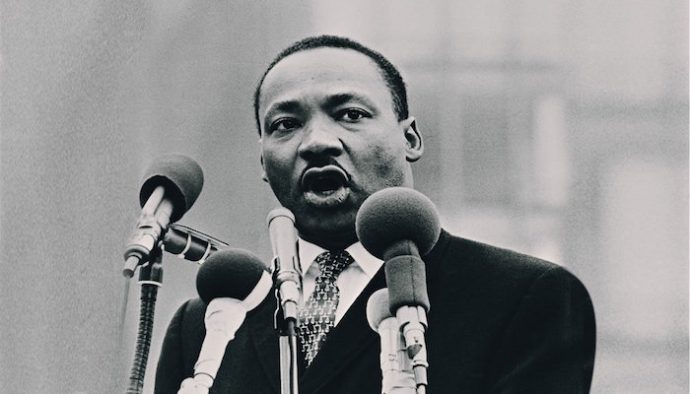“Wherever the early Christians entered a town the power structure got disturbed and immediately sought to convict them for being ‘disturbers of the peace’ and ‘outside agitators.’ But they went on with the conviction that they were a ‘colony of heaven’ and had to obey God rather than man. They were small in number but big in commitment. They were too God-intoxicated to be ‘astronomically intimidated.’ They brought an end to such ancient evils as infanticide and gladiatorial contest. Things are different now. The contemporary Church is so often a weak, ineffectual voice with an uncertain sound. It is so often the archsupporter of the status quo. Far from being disturbed by the presence of the Church, the power structure of the average community is consoled by the Church’s silent and often vocal sanction of things as they are.” ― Martin Luther King Jr., Letter from the Birmingham Jail
Dr. King was arrested after helping organize and lead a nonviolent campaign in Birmingham, Alabama beginning on April 3, 1963. On April 10, a circuit court judge issued an injunction against protests like this, which the leaders of the Birmingham campaign, including Dr. King, announced they would disobey. Then, on April 12, he along with other marchers were arrested. It was Good Friday.
In the Birmingham jail, Dr. King got a copy of the newspaper of the day in which he read a statement made by eight white Alabama pastors that spoke against Dr. King and his methods. He wrote a response in long hand, the document we now know as the Letter from the Birmingham Jail.
It’s a good and right thing to read today, and I’m particularly moved by the section above in which Dr. King called upon the church to have a prophetic voice and stance in society – to “disturb” the prevailing culture by their presence. One of the ways the early church did this was through their baffling unity across the traditional boundary lines of their day. In fact, in the Book of Ephesians, Paul held up the church itself – specifically, the unity of the church across the lines of race – as the evidence of the power of the gospel.
The church at Ephesus was a racially diverse congregation. Jews and Greeks worshiped alongside each other, and that last point is key. There wasn’t a Jewish worship service at 9 and a Greek service at 10:30, each with different music and different communication styles. Instead, there was one, unified congregation. That’s not to say they didn’t have their troubles; they certainly did. But they were together under one head. That, according to Paul, is the most convincing evidence that the gospel is real:
“But now in Christ Jesus, you who were far away have been brought near by the blood of the Messiah. For He is our peace, who made both groups one and tore down the dividing wall of hostility” (Eph. 2:13-14).
Interesting, right? Convicting, too? I think so.
What did Paul point to to validate the gospel? It wasn’t an apologetic of logic – an effort to prove with tangible facts and step by step reasoning why the life, death, and resurrection of Jesus makes sense. Neither was it offering first hand testimonies of encounters with the risen Savior. Neither still was it recounting his own encounter with Jesus on the Damascus Road and pointing to his own dramatic change of life as proof of the gospel. Those are all fine things, but that’s not what Paul held up as the validation for the gospel. Not in this book.
In Ephesians, the gospel apologetic is the church itself. May it be so once again.
Subscribe to MichaelKelley.co
Never miss a new post. Subscribe to receive these posts in your inbox and to receive information about new discipleship resources.






1 Comment